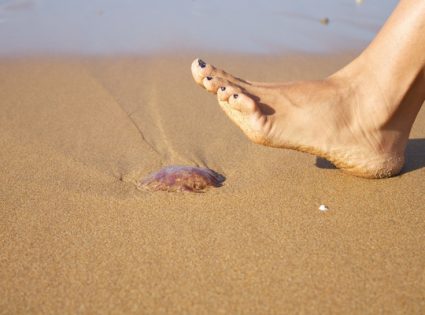Beaches are certainly among the most popular destinations for vacationers. There is indeed no shortage of activities at the seaside. You can play ball, take a dip in the water, go diving or simply enjoy the sun. However, beach vacations are also synonymous with bad surprises, such as jellyfish stings, especially since these marine animals are currently invading the coast more and more. This is due to the polluting activities of humans and overfishing. Warming waters also encourage the proliferation of these animals.
Although most jellyfish species are not deadly to humans, their sting can cause allergic reactions in some people. So what should you do if you are stung by a jellyfish?
How Do You Know if It’s a Jellyfish Sting?
Jellyfish are marine animals that float on the water and, pushed by the wind, can sometimes wash up on the coast. This is why it is possible to be stung even while walking on the sand and rocks. But, theoretically, jellyfish do not sting. In fact, when they touch you, their tentacles project a venomous liquid. This contact lasts only a thousandth of a second but is accompanied by a sensation resembling an electric discharge. After the stung, the person feels intense pain, itching, or tingling. The burn is easily visible, as it becomes red like an insect bite. The lesion may disappear after a few days or several months. If the bites are numerous, they can manifest themselves by swelling the skin and fever or loss of consciousness. This is why you must react quickly if you are stung.
What Are the Right Actions To Take?
When stung by a jellyfish, the first reaction to avoid is to panic. Although the pain caused by the sting is excruciating, try to stay calm. Get out of the water right away and sit down somewhere. When the jellyfish grazed your skin, the fragments of its tentacles remained on your skin. Start by gently removing them from your skin. Use a thin object or cardboard, but not your fingers. You can also gently rub the wound with fine wet sand. Then rinse the infected area with seawater or vinegar. If you have a medical kit or a first aid station on the beach, clean and disinfect the wound with an antiseptic. Then apply antihistamine ointment. The pain should subside within a day. If it does not, do not hesitate to consult a doctor.

Can I Avoid Being Stung by a Jellyfish?
Although it is not easy to detect the presence of jellyfish in the sea, it is possible to avoid them. These animals only appeared in the summer and only in certain regions in the past. Due to global warming, they increase in all seasons. The best way to avoid them is to ask around. Otherwise, check for warning signs near the beach. You can also find protective lotions in pharmacies that should be applied before diving into the water. These products cannot repel them, but will lessen the effects of the poison they will project. Although it is very pleasant to walk barefoot along the beach, protect yourself and wear sandals.
